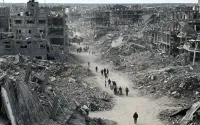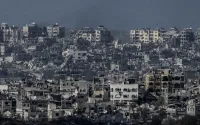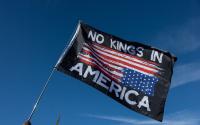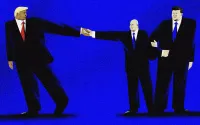My task was to spend the whole evening - about five hours - at the surgical emergency ward of Yarmouk Hospital in south-west Baghdad.
That way I could witness at first hand the results of the lawlessness and insecurity which rule this city, outweighing in most Iraqi eyes the benefits of the six-month-old American occupation.
Up until 2200 it looked as though it was going to be a quiet evening for the Yarmouk - 50 admissions, one dead on arrival and only a few critical cases.
Then suddenly the whole ward filled with shocked humanity and crumpled, bloodied bodies.
Stray bullets
We arrived at 1700 to find four beds occupied in the emergency ward - including a couple of kids who had hurt themselves falling over and Salam Ali Hussein, who had been the victim of an attempted carjacking.
Mr Hussein had been passing through the Karada district when four men rushed up to his car, one of whom sprayed pepper spray, or CS, into his face.
He held onto the wheel and received a head injury in the ensuing struggle. Some people from the neighbourhood then chased the thieves away.
 Hussein Kadhim's game of football was interrupted by a stray bullet |
At 1715 the first new admission comes in (Patient 1) - Adhib Abdul Hamid who has been hit by an AK47 bullet in his left shoulder.
The shot must have been fired into the air some distance away - perhaps during a wedding party - and Mr Abdul Hamid was unlucky enough to be standing in his doorway when the bullet landed there.
Patient 3 arrives 10 minutes later with an identical wound in his right shoulder - this time the unfortunate recipient is 13-year-old Hussein Kadhim, who had been out in the street playing football.
At 1750, Muyyad Nijm (Patient 8) is brought in with a bullet in his back. Of the three he is the only one whom doctors are able to treat in the emergency unit as the bullet is near the surface. The others are sent for surgery.
"This is a very bad Iraqi habit, shooting into the air at weddings" says one of the four doctors on duty, Dr Osama.
"Saddam used to ban it, and you'd be imprisoned two or three months if you broke this law."
Also in the first hour two young women, Patients 4 and 11, are brought in - one with a black eye and the other a suspected stab wound to the leg. Both appear to be victims of domestic violence, but neither says so.
At 1800, a woman of about 80 (Patient 12) is admitted with stomach pains, accompanied by her daughter and another elderly woman. The two companions are very concerned about getting home by themselves after dark.
They earnestly request to use our satellite phone to call male relatives in Karada to pick them up. The men arrive at 2045.
The second hour is largely uneventful, with superficial injuries, until Patient 21, 25-year old Haidar Kadhim, is brought in having been shot at a wedding in Hai Jihad district.
The perpetrator had been shooting in the air, but was pushed over by a friend, causing the AK47 to discharge into Mr Kadhim's lower back. X-rays show the bullet has travelled up into his chest.
The next hour is even less eventful, although there is much commotion around Mr Khadim who is groaning loudly and being comforted by four companions.
Bullet 'fall'
At the stroke of 2000, an unidentified man (Patient 29) in tattered clothes is wheeled in having been found by police at the side of the motorway.
He is lifted onto a bed where he is pronounced dead by the doctors. General surgical officer Dr Muhammad says it was probably a hit-and-run car accident.
The body is taken to the hospital morgue but in all likelihood it will never be identified, says Dr Muhammad.
 Mutada Kadhim's X-ray revealed a bullet behind his cheek |
Five minutes later a mother arrives carrying an infant (Patient 30) bleeding profusely from his head. At least half a dozen relatives look on anxiously.
The child's name is Mutada Kadhim. He was playing in the yard when suddenly he fell down with a cut on his cheek, family members say.
Initially doctors are not unduly concerned, but the X-ray shows an AK47 round lodged behind Mutada's cheek.
Doctor Muhammad orders that the baby be transferred to the neurological unit at Bab al-Sharji hospital. He writes a note explaining the situation for his colleagues there which the family take with them; there are no telephones at Yarmouk to call ahead.
When the family has taken the child away, doctors confide that this is a very serious case and they do not give Mutada a high chance of survival.
Peak time
Doctors explain that this is usually the busiest time - between evening prayers and curfew at midnight. Indeed, the ward fills up considerably between 2000 and 2200, but mainly with non-critical cases.
Dr Samir Geobouri, who had been on duty the previous night, says he had to treat victims of a drive-by shooting outside a mosque in Amariya precisely 24 hours earlier.
Four dead bodies had been brought to the hospital from Amariya and seven people with non-fatal wounds. There had also been an explosion - a bomb in all probability - which injured eight people.
 Dr Osama looks at a patient |
"Tonight it is much quieter, inshalla," says Dr Samir.
Patient 33 is a very distressed 12-year-old boy who has first and second degree burns on his legs and face sustained when a domestic generator blew up.
Patient 34, a man in his 30s, comes in with head wounds, accompanied by three companions. He refuses to be photographed and one of his companions says he was injured after "slipping on some water".
He is one of several of cases tonight where the doctors do not believe the story offered.
"They say things like that not to arouse suspicion of the police," says Dr Osama.
Donkey trouble
But there is no doubting Patient 40, Raid Jabbar, is telling the truth after he is carried in by two friends at 2100 clutching his leg in agony.
"This is really one of the strangest cases we've had today," says Dr Samir after examining Mr Jabbar.
"This patient has been kicked by a donkey."
A guide to living conditions and the reconstruction effort in Iraq |
Dr Samir is a very compassionate man, but he cannot contain a laugh at the absurdity of the injury. The patient's two friends begin laughing too, and even Mr Jabbar joins in between his bouts of severe pain.
The jovial mood quickly disperses as Patients 41, 42 and 43 arrive one after the other, all with knife wounds received in separate incidents - two in gang fights and one set upon by thieves.
And just before 2200, a young Kurdish man (Patient 47) is admitted with gunshot wounds to both legs. His companions say it was a "political attack".
They had been fired on as they were driving through the Mansour district, the companions say. They show doctors ID cards issued by the Kurdish Socialist Party.
Shrapnel
Our team are just preparing to wind up this "Hospital Watch" session at 2200, when a man (Patient 48) is brought in with blood covering his chest, neck and groin.
It quickly emerges that there has been a blast in south-west Baghdad - a mortar or explosive device has detonated outside a bank.
Patients 49 to 58 arrive in a disorganised stream over the next 10 minutes.
Most have shrapnel wounds and are in a stable condition, Patient 52 clutching his armpit, Patient 53 a policeman who appears to have been wounded in the right eye.
But Patient 54 is stretchered in with massive injuries to leg and abdominal tissue. Most of his right thigh bone and his intestines are exposed and he has lost large quantities of blood.
Patient 55 - a woman in her 30s - appears to have only received minor injuries but she is hysterical and starts shouting and screaming over the agitated chatter in the ward.
"Why are there Americans in this hospital?" she shouts (meaning us).
So the BBC team withdraws at about 2215, just as the armed guards of the Facilities Protection Service start pushing non-essential people out of the emergency ward so doctors can deal with the critical patients.
It has been a long evening that showed just how the Iraqi people continue to suffer from public disorder and normally avoidable death or injury.
None of the incidents above - including the Thursday explosion and Wednesday's mosque shooting - appear to have been reported elsewhere.







